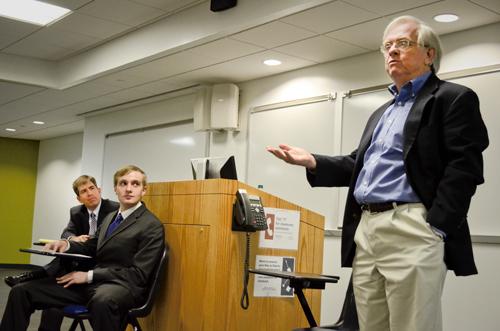
This post was written by Hatchet reporter Alyssa Bruns.
The economy has been at the heart of both presidential candidates’ campaigns this year, but professor Donald Parsons argued Monday that the results of Election Day are unlikely to impact the U.S. economy.
In the first event held by the newly formed GW Undergraduate Economics Club, Parsons said he doubted the country will see serious change despite both candidates trying to paint the election as a choice between two opposing economic doctrines.
“It’s not going to matter very much when you wake up on Wednesday morning,” Parsons said. “The fact is, there is a political equilibrium out there and it’s run by a lot of people with a lot of cash, and they buy politicians.”
Parsons, a labor economist, was wary of the lack of substance in each candidates’ campaign promises, like skimpy budget plans. He added that while he prefers Romney’s economic policies, he has followed the campaign with serious skepticism.
“The truth is, there is absolutely nothing either of these people say that you would want to take as any indication about what’s going to happen in the next year,” he said.
But Jay Shambaugh, an associate professor of economics and international affairs, held out hope.
The former chief economist at the White House Council of Economic Advisers under Obama, Shambaugh said he’s experienced firsthand how presidents hold sway over economic policies.
He served as one of the president’s lead economic advisers in the year after Congress passed a stimulus package that economists say helped spur the economy.
“I think there is some real distance between these candidates on economic policy issues,” Shambaugh said. “Well, I will say in my case, I do think that broadly, the president’s approach is a better approach.”



